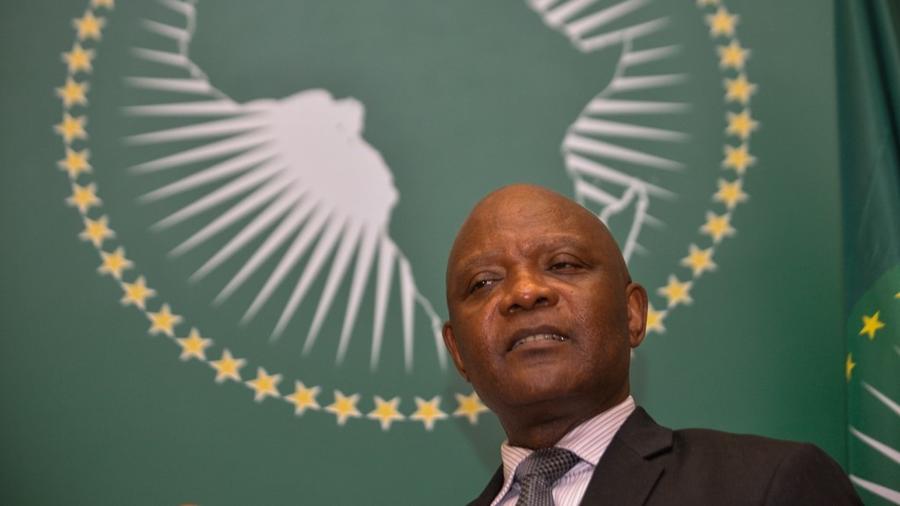 John Nkengasong, director of the African Centres for Disease Control, speaks during a press conference on COVID-19 at African Union (AU) headquarters in Addis Ababa, Ethiopia, on March 10, 2020. (MICHAEL TEWELDE / AFP)
John Nkengasong, director of the African Centres for Disease Control, speaks during a press conference on COVID-19 at African Union (AU) headquarters in Addis Ababa, Ethiopia, on March 10, 2020. (MICHAEL TEWELDE / AFP)
TORONTO / GENEVA / LONDON / JOHANNESBURG / PARIS / BRASILIA / PRAGUE / HELSINKI / HAVANA / NAIROBI / COPENHAGEN - Eritrea has yet to start vaccinating its population against COVID-19, the head of the African Centres for Disease Control said on Thursday.
"Eritrea is the only country now that has not joined the family of 55 member states (of the African Union) that are moving forward with vaccination, but we are not giving up," John Nkengasong told an online media briefing.
African governments will have no choice but to start imposing vaccine mandates if citizens refuse to get vaccinated against COVID-19, said Nkengasong.
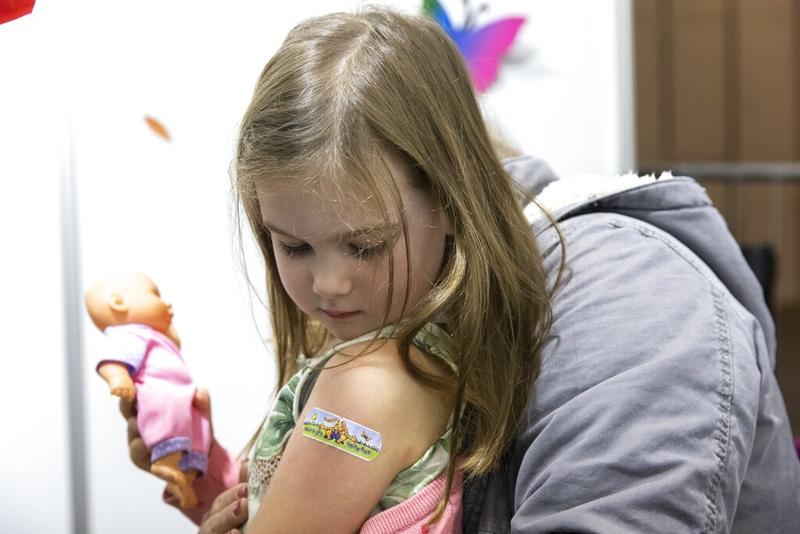 A child looks at her band aid after receiving the vaccination against the COVID-19 virus in Tulln, a city close from Vienna, Austria on Dec 1, 2021. (LISA LEUTNER / AP)
A child looks at her band aid after receiving the vaccination against the COVID-19 virus in Tulln, a city close from Vienna, Austria on Dec 1, 2021. (LISA LEUTNER / AP)
Austria
Austria will keep a range of regional pandemic restrictions in place after ending a nationwide lockdown for inoculated people, with strict limits affecting the unvaccinated.
The government in Vienna is ending a three-week lockdown on Sunday for most people after a decline in confirmed infections, even as the number of patients being treated at hospitals remains high.
The move contrasts with a flurry of new measures being enacted elsewhere in Europe in response to concern over a new coronavirus variant.
Austria has been at the forefront of European efforts to raise vaccination rates by favoring the inoculated and putting limits on others.
While only a fraction of those who had previously not taken the jab have sought the inoculation as a result of the policies, the government is betting on continued curbs to boost the vaccination rate.
Unvaccinated Austrians will still be required to stay at home except for going to work, doing essential shopping and taking daily exercise.
For others, the government will allow non-essential shops and services to reopen from Sunday, according to national guidelines presented by Chancellor Karl Nehammer on Wednesday.
In principle, restaurants will also be allowed to resume in-person dining until 11 pm each day, while nightclubs will stay shut.
“I understand that this policy feels arduous for the unvaccinated, but they have the opportunity to get a shot,” Nehammer said.
The relaxations of the curbs for the inoculated coincide with the emergence of the Omicron strain of the coronavirus, and may lead to tougher measures being reintroduced, something policy makers are keen to avoid, Vienna Mayor Michael Ludwig said at the same press conference.
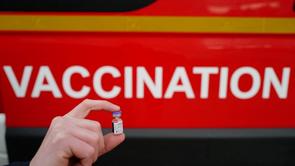 In this file photo taken on March 19, 2021, a firefighter holds a vial of the Pfizer-BioNTech COVID-19 vaccine, in front of the firefighter truck, in Vaillhauques, southern France. (SYLVAIN THOMAS / AFP)
In this file photo taken on March 19, 2021, a firefighter holds a vial of the Pfizer-BioNTech COVID-19 vaccine, in front of the firefighter truck, in Vaillhauques, southern France. (SYLVAIN THOMAS / AFP)
BioNTech / Pfizer
BioNTech and Pfizer said on Wednesday a three-shot course of their COVID-19 vaccine was able to neutralize the new Omicron variant in a laboratory test, an early signal that booster shots could be key to protection against infection from the newly identified variant.
The German and US companies said two doses of their vaccine resulted in significantly lower neutralizing antibodies but could still be protective against severe disease.
"The first line of defence, with two doses of vaccination, might be compromised and three doses of vaccination are required to restore protection," BioNTech Chief Medical Officer Ozlem Tuereci said at a press conference.
The companies also said they could deliver an upgraded vaccine targeted specifically at the Omicron variant in March 2022 if one is needed.
BioNTech and Pfizer are the first manufacturers of a COVID vaccine to issue an official update on the efficacy of their shot against Omicron.
In samples of blood taken around a month after the third shot the Omicron variant was neutralized about as effectively as two doses neutralized the original virus.
BioNTech CEO Ugur Sahin suggested that countries might consider shortening the time period between second and third doses of the vaccine to combat the new variant.
He cited recent moves by countries including Britain to bring the third shot forward to three months after the second shot, from six months previously.
"We believe this is the right way to go particularly if the Omicron is now spreading further, to enable a better level of protection in the winter season," Sahin said.
The companies said they would continue efforts to bring an Omicron-specific COVID-19 vaccine to market. Work started on Nov 25.
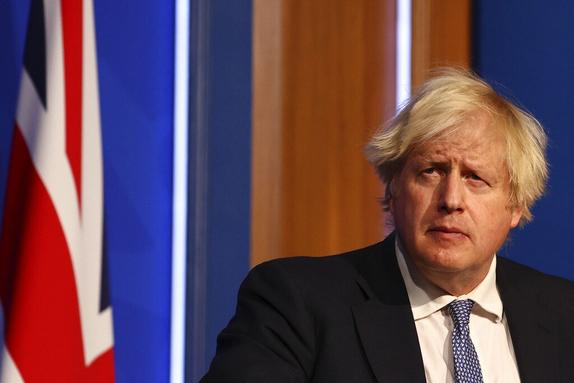 Britain's Prime Minister Boris Johnson speaks at a press conference in London's Downing Street on Dec 8, 2021, after ministers met to consider imposing new restrictions in response to rising cases and the spread of the omicron variant. (ADRIAN DENNIS / POOL VIA AP)
Britain's Prime Minister Boris Johnson speaks at a press conference in London's Downing Street on Dec 8, 2021, after ministers met to consider imposing new restrictions in response to rising cases and the spread of the omicron variant. (ADRIAN DENNIS / POOL VIA AP)
Britain
British Prime Minister Boris Johnson imposed tougher COVID-19 restrictions in England on Wednesday, ordering people to work from home, wear masks in public places and use vaccine passes to slow the spread of the Omicron coronavirus variant.
Undermined by accusations that his staff partied at Downing Street during a Christmas lockdown last year, Johnson said Omicron was spreading rapidly and he had no choice but to move to "Plan B" while a vaccine booster program rolls out.
ALSO READ: UK PM apologizes for staff joking about lockdown party
While still a long way from the full lockdowns imposed earlier in the pandemic, the new measures were described as a "hammer blow" for city centre restaurants, cafes and shops that are desperate for Christmas trade to rebuild their finances.
Many lawmakers in Johnson's own party are also angry with the new restrictions, fearing the impact they will have after the economy shrank by a historic 10 percent last year.
"While the picture may get better, and I sincerely hope that it will, we know that the remorseless logic of exponential growth could lead to a big rise in hospitalizations and therefore, sadly, in deaths," Johnson told a news conference.
Part of those measures, such as reintroducing masks on public transport and in shops, had already been brought in, but on Wednesday Johnson said people should also now work from home.
Face masks will be required in public venues such as theatres and cinemas and a COVID pass will be mandatory for access to nightclubs and venues with large crowds.
Johnson said the new measures were needed after 568 cases of Omicron were found in the country, with data suggesting its doubling time of infections could be between two and three days.
Health Secretary Sajid Javid said officials estimated that the number of Omicron infections was actually around 20 times higher than the number of confirmed cases, meaning they could be closer to 10,000.
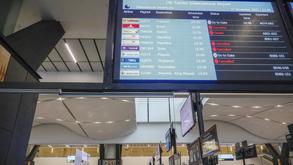 Airport staff assist travelers at various check-in counters while an electronic flight notice board displays some cancelled flights at OR Tambo International Airport in Johannesburg on Nov 27, 2021, after several countries banned flights from South Africa following the discovery of a new COVID-19 variant Omicron. (PHILL MAGAKOE / AFP)
Airport staff assist travelers at various check-in counters while an electronic flight notice board displays some cancelled flights at OR Tambo International Airport in Johannesburg on Nov 27, 2021, after several countries banned flights from South Africa following the discovery of a new COVID-19 variant Omicron. (PHILL MAGAKOE / AFP)
Canada
Canada's ban on travelers from southern African countries and its refusal to recognize these countries' PCR tests, aimed at preventing the spread of the coronavirus Omicron variant, is an obstacle for Canadians heading home and increasing international pressure to reverse the measures.
Few countries have imposed Omicron restrictions similar to Canada's requirement that travelers from 10 southern African countries get PCR tests in a third country before coming to Canada.
In the face of travel snarls and accusations that these measures are punitive and lack evidence, Canada is under pressure to reverse them.
Canada's ban caught travelers, including the junior women's field hockey team, off guard. Some complained of mixed messaging from government agencies.
Richard Saunders, a Canadian politics professor who had been doing fieldwork in Zimbabwe and South Africa, was desperate to return home last week.
The Canadian High Commission suggested he fly to Addis Ababa and get a COVID-19 test there despite Canada's advising its citizens not to travel to Ethiopia because of the armed conflict.
When Canada eventually made a limited-time exemption for certain Lufthansa Airways flights through Frankfurt, Saunders almost missed the news as the message from Canadian authorities slipped into his junk folder.
"I've been working in southern Africa for 40 years and the damage this does to Canada's reputation as a fair player, a fair dealer, is really significant," Saunders said as he awaited the outcome of his latest COVID-19 test from hotel quarantine near Toronto's airport.
It remained unclear Tuesday what would happen to Canadians trying to leave South Africa after Dec 13, the date Canada's Lufthansa exemption ends.
A spokesperson for Canada's Global Affairs department said Canadians should email them. There are more than 1,800 Canadian registered with Global Affairs in South Africa but registration is voluntary. It is unclear how many want to leave the country.
Global Affairs did not immediately comment when asked about how the measures impact Canada's reputation.
"The health rationale is a rationale that has been assessed and proposed by the Public Health Agency of Canada, the experts," Health Minister Jean-Yves Duclos told reporters Tuesday. He would not explain their reasoning.
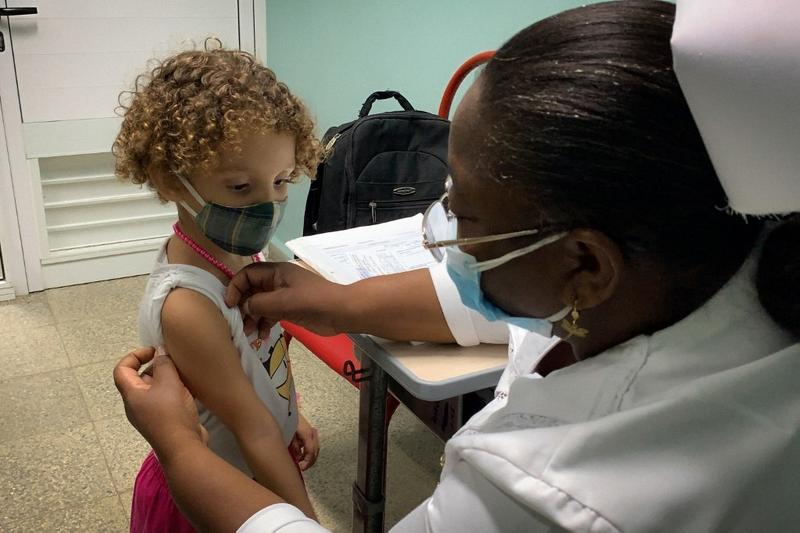 In this file photo taken on Aug 24, 2021,
a nurse prepares Roxana Montano, 3, to receive her dose of Soberana Plus, a Cuban vaccine against COVID-19, at Juan Manuel Marquez hospital in Havana, as part of the vaccine study in children and adolescents. (ADALBERTO ROQUE / AFP)
In this file photo taken on Aug 24, 2021,
a nurse prepares Roxana Montano, 3, to receive her dose of Soberana Plus, a Cuban vaccine against COVID-19, at Juan Manuel Marquez hospital in Havana, as part of the vaccine study in children and adolescents. (ADALBERTO ROQUE / AFP)
Cuba
Cuba detected its first case of the Omicron variant of the coronavirus, Cuban state news agency ACN reported on Wednesday night.
It came after a health worker from Cuba's westernmost province of Pinar del Rio tested positive for the virus after arriving on the island from Mozambique on Nov 27.
Eighteen people tested negative for the virus as part of contact tracing of the patient, according to ACN.
Earlier this month, the Caribbean nation tightened travel rules for inbound international passengers.
All travelers flying into Cuba from South Africa, Lesotho, Botswana, Eswatini, Namibia, Zimbabwe, Malawi, and Mozambique are now required to show vaccination certificates and negative results of COVID-19 polymerase chain reaction (PCR) tests taken within 72 hours of arrival.
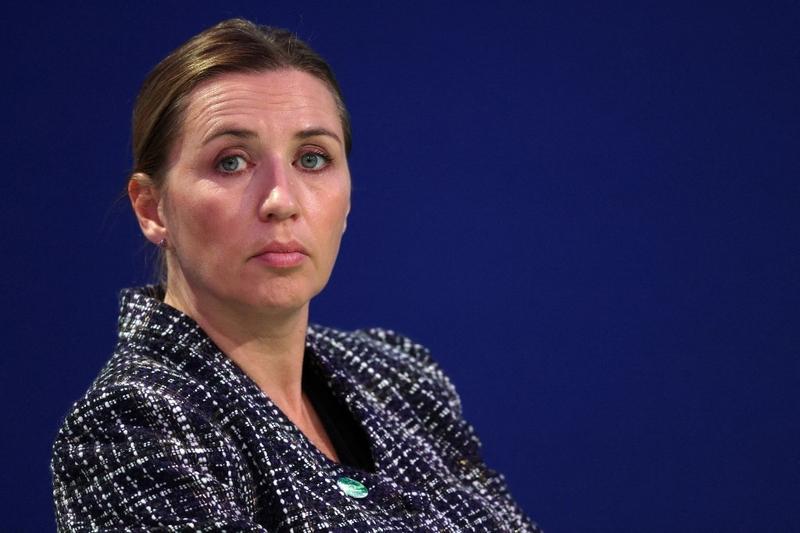 Denmark's Prime Minister Mette Frederiksen waits to make a national statement on the second day of the COP26 UN Climate Summit in Glasgow on Nov 2, 2021. (ADRIAN DENNIS / POOL / AFP)
Denmark's Prime Minister Mette Frederiksen waits to make a national statement on the second day of the COP26 UN Climate Summit in Glasgow on Nov 2, 2021. (ADRIAN DENNIS / POOL / AFP)
Denmark
Danish Prime Minister Mette Frederiksen on Thursday defended her decision to order a nationwide cull across Denmark's mink farms a year ago over coronavirus concerns before appearing before a commission of inquiry.
The government ordered the cull of some 17 million mink to forestall the uncontrollable spread of a mutated variant of the coronavirus, all but destroying an industry recognized in the fashion industry around the world for its high-quality furs.
"We were unfortunately forced to make a decision a year ago about the culling of all mink," she told reporters before entering the court where the commission is sitting. "It was the right decision, and now I will go in and answer the questions."
While Danes broadly approved of Frederiksen's initial handling of the pandemic, the government was thrown into political turmoil when it emerged that there had been no legal basis to order the cull of healthy mink.
The incident eventually led to the exit of the agriculture minister and parliament commissioned an inquiry into whether ministers including Frederiksen had known that the legal framework was absent.
Outside the court in Copenhagen, protesters carried placards reading "Why is Mette lying?" and "Who controls Mette?".
The commission, made up of a judge, lawyers and a legal experts, is due to finish its investigation in April.
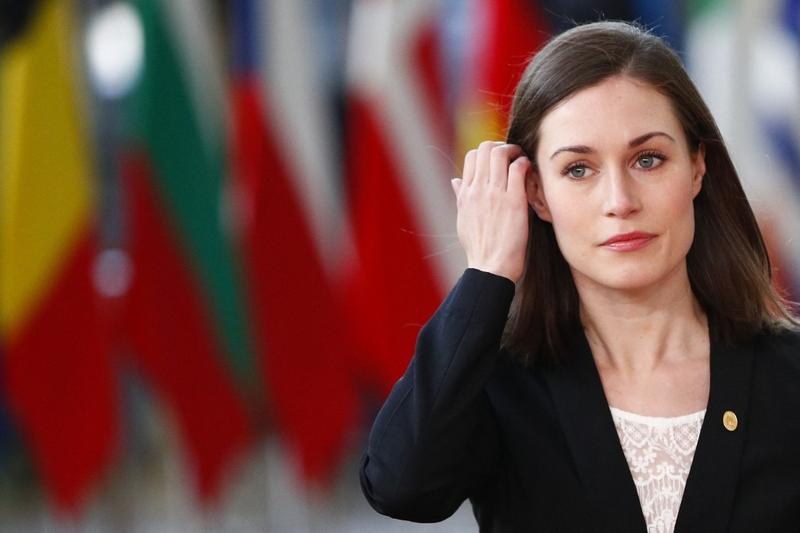 Finland's Prime Minister Sanna Marin arrives on the second day of a European Union summit at The European Council Building in Brussels on Oct 22, 2021. (JOHANNA GERON / POOL / AFP)
Finland's Prime Minister Sanna Marin arrives on the second day of a European Union summit at The European Council Building in Brussels on Oct 22, 2021. (JOHANNA GERON / POOL / AFP)
Finland
Finnish Prime Minister Sanna Marin apologized to the public on Wednesday after a photo surfaced of her in a nightclub following the foreign minister testing positive for COVID-19.
"I did wrong. I should have considered the situation more carefully," Marin said in a television interview by public broadcaster Yle on Wednesday night.
Marin said she decided not to cut her night out short on Saturday after being told she had been exposed to the coronavirus the day before, she wrote on Facebook on Monday after a Finnish gossip magazine published a photo of Marin in a crowded nightclub.
Economic Affairs Minister Mika Lintila attended a floorball match between Finland and Latvia on Sunday despite being advised to avoid contact with others, Helsingin Sanomat newspaper reported on Wednesday.
Defense Minister Antti Kaikkonen went to a dinner party on Saturday while Finance Minister Annika Saarikko and Science and Culture Minister Antti Kurvinen cancelled their attendance of the same event to avoid contacts, evening paper Ilta-Sanomat reported on Tuesday.
All three ministers were exposed on Friday at a meeting attended by Foreign Minister Pekka Haavisto, who on Saturday tested positive for COVID-19.
Marin said she was at a restaurant when she received a phone call from her state secretary informing her about the exposure.
"He said ministers would not be quarantined because they all have been vaccinated twice," Marin wrote on Facebook, explaining why she continued socializing.
The Prime Minister's office later said it had sent the exposed ministers two text messages on Saturday recommending that they avoid contact with other people.
Marin has since taken two COVID-19 tests that were negative. Lintila and Kaikkonen have also tested negative.
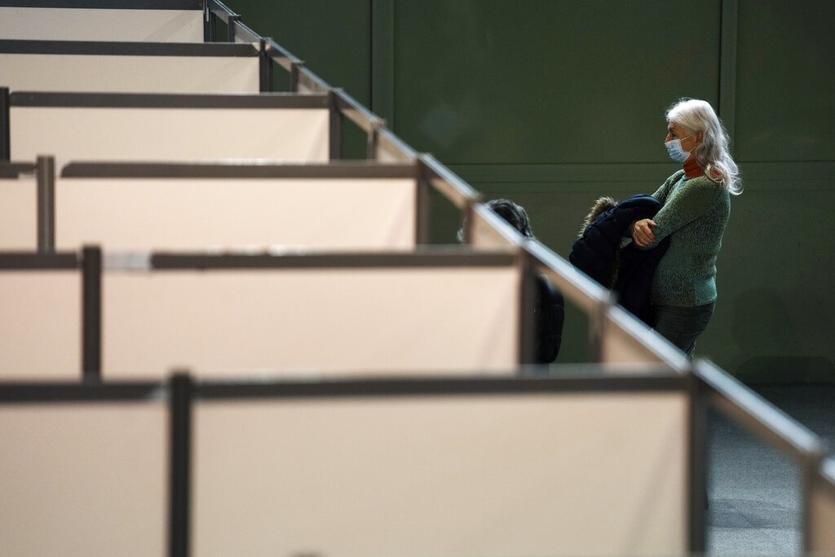 A woman waits to receive Pfizer's COVID-19 vaccine at a vaccination site, in Fontainebleau, south of Paris on Dec 6, 2021. (THIBAULT CAMUS / AP)
A woman waits to receive Pfizer's COVID-19 vaccine at a vaccination site, in Fontainebleau, south of Paris on Dec 6, 2021. (THIBAULT CAMUS / AP)
France
France's Ile-de-France region on Wednesday said that all hospitals are activating an emergency plan due to the strained COVID-19 situation.
The plan includes stepping up the number of ICU beds and, if necessary, reschedule treatments to free up capacities.
With more than 12 million people, the Ile-de-France - with the capital Paris at its centre - is France's biggest region.
France on Wednesday saw a new daily record of infections since November 2020 with 61,340 new COVID-19 cases confirmed in the past 24 hours.
This brings the cumulative number of COVID-19 cases in the country to 8,048,931.
According to the French Public Health Agency, the incidence rate has reached 448 cases per 100,000 residents. The death toll has passed 120,000, with 133 deaths recorded in the past 24 hours across the country.
Nigeria
Nigeria plans to destroy about a million coronavirus vaccines that arrived in the country only six weeks before their expiration date and could not be administered in time, according to a health official.
The West African nation has used most of the more than 10 million donated doses that have mainly been provided by European countries, and is asking donors to ship them well before the expiration date.
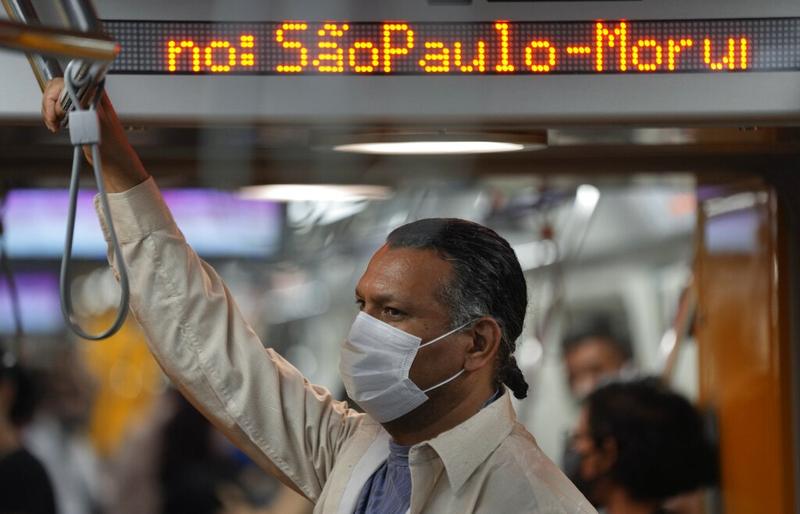 A commuter wears a protective face mask in a subway station, in Sao Paulo, Brazil on Dec 1, 2021 amid the COVID-19 pandemic. (ANDRE PENNER / AP)
A commuter wears a protective face mask in a subway station, in Sao Paulo, Brazil on Dec 1, 2021 amid the COVID-19 pandemic. (ANDRE PENNER / AP)
Pan American Health Organization (PAHO)
The Omicron variant of the coronavirus has so far been detected in the Americas in Argentina, Brazil, Canada, Chile, Mexico and the United States, but it is just a matter of time before it circulates in more countries, the Pan American Health Organization (PAHO) warned on Wednesday.
The regional health agency said coronavirus infections have turned up in Canada and parts of Mexico, such as Baja California. Except for Panama, Central America is experiencing a steep decline in cases.
In South America, there has been a steady increase in Bolivia, Peru and Colombia, while Ecuador, Chile and Argentina are reporting a drop, PAHO said.
Research is ongoing to better understand Omicron's behavior and the potential risks for the Americas, PAHO director Carissa Etienne told reporters on a webcast news conference.
"The arrival of a new variant doesn't necessarily mean that things will be worse, but it does mean that we must be extra-vigilant in the short term," she said.
Vaccines remain a critical tool to reduce hospitalizations and deaths and limit the appearance of new variants, PAHO said.
So far, 55 percent of the people in Latin America and the Caribbean have been fully vaccinated against COVID, and 20 countries in the region have yet to reach the year-end vaccination coverage target of 40 percent set by the World Health Organization.
Guatemala, Haiti, Jamaica and St Vincent and the Grenadines remain far behind, Etienne said.
ALSO READ: Omicron threat may be countered with extra dose of vaccine
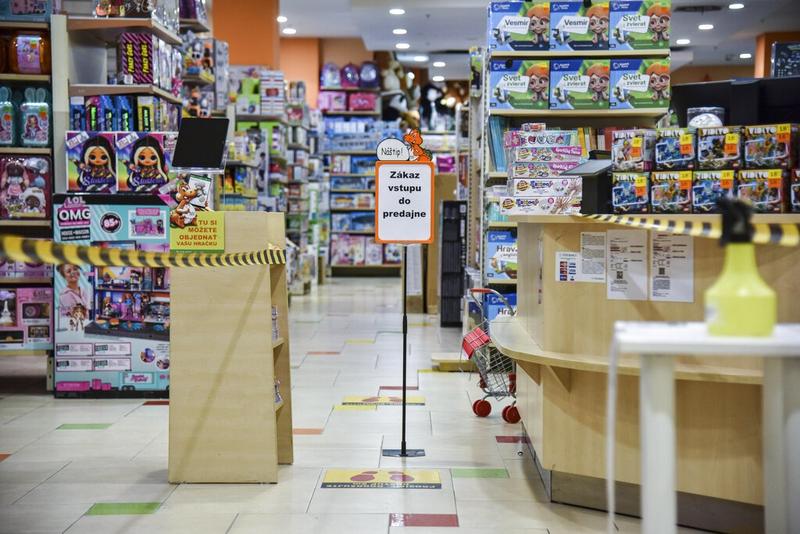 A No Entry sign is placed inside a toy store, now serving takeaway, at a shopping center in Bratislava, Slovakia on Nov 25, 2021, amid the coronavirus pandemic. (Pavol Zachar/TASR via AP)
A No Entry sign is placed inside a toy store, now serving takeaway, at a shopping center in Bratislava, Slovakia on Nov 25, 2021, amid the coronavirus pandemic. (Pavol Zachar/TASR via AP)
Slovakia
Slovakia will on Friday re-open non-essential shops and some services for those vaccinated against COVID-19 while at the same time extending a lockdown for others and closing some schools, Health Minister Vladimir Lengvarsky said.
Lengvarsky had sought to extend the general lockdown until Dec 16, and to ease it for the vaccinated from Dec 17.
But the government, seeking to raise the appeal of vaccinations in one of Europe's least inoculated countries, opted to ease rules now for those who received the shots while extending them until Jan 9 for the rest.
All shops and services such as fitness centres and hairdressers will open for those who have been inoculated, Lengvarsky said on Wednesday.
Hotels will open for vaccinated in the next stage, from Dec. 25, but restaurants will remain closed for all into the new year. In other tightening steps, high schools and upper grades at elementary schools will switch to online classes Dec 13-17, the last full week before the Christmas holidays.
Slovakia had 3,503 patients hospitalized for COVID-19 as of Wednesday, of whom 85 percent were not fully vaccinated, government data showed.
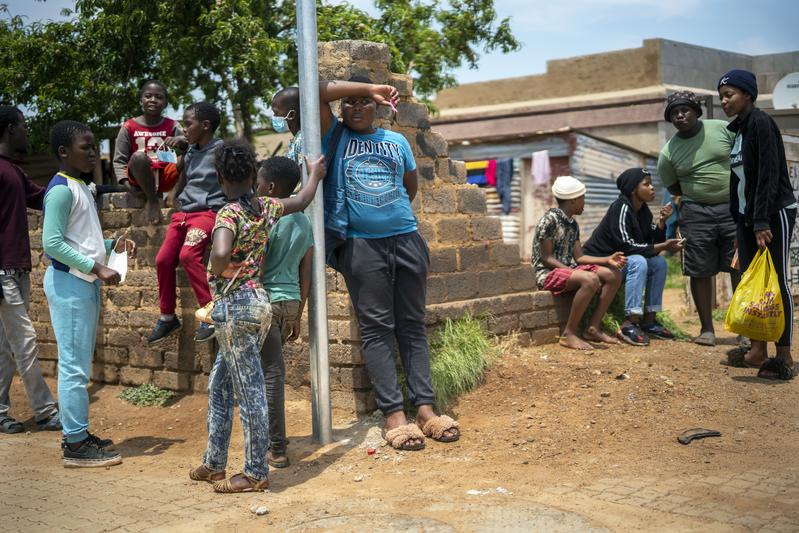 Residents stand in the streets of Lawley, South Africa, during a visit of local government officials for the launch of the Vooma vaccination program against COVID-19 on Dec 3, 2021. (JEROME DELAY / AP)
Residents stand in the streets of Lawley, South Africa, during a visit of local government officials for the launch of the Vooma vaccination program against COVID-19 on Dec 3, 2021. (JEROME DELAY / AP)
South Africa
South Africa reported nearly 20,000 new COVID-19 cases on Wednesday, a record since the Omicron variant was detected, and 36 new COVID-related deaths.
It was not immediately clear how many of the infections were caused by Omicron, given only a fraction of samples are sequenced, but experts believe it is driving South Africa's fourth wave of infections.
The statistics from the National Institute for Communicable Diseases (NICD) brought the confirmed number of cases in the country to 3.071 million, with more than 90,000 COVID-linked deaths since the pandemic started.
But the economic fallout for South Africa - which has been hit by international travel bans since its scientists correctly identified the variant late last month - has been devastating.
President Cyril Ramaphosa was due to meet with senior officials in charge of the COVID-19 response this week, and will decide on whether to tighten low-level lockdown restrictions. That seems unlikely, as hospital capacity is far from being overwhelmed, as it was in previous waves.
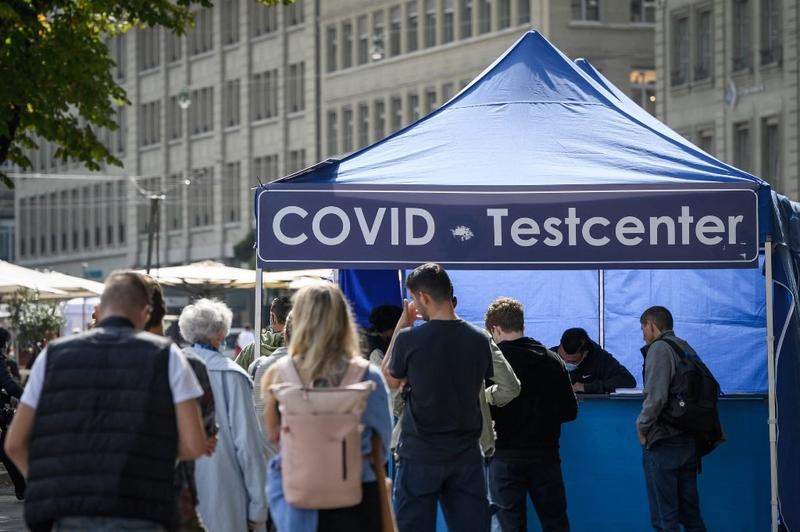 People queue at a COVID-19 test center installed in a street of Swiss capital Bern on Sept 17, 2021. (FABRICE COFFRINI / AFP)
People queue at a COVID-19 test center installed in a street of Swiss capital Bern on Sept 17, 2021. (FABRICE COFFRINI / AFP)
Switzerland
Switzerland recorded more than 12,000 new infections, the most in a single day.
Additional measures to fight the pandemic took effect earlier this week. They include an expanded use of masks and the COVID-19 certificate, which indicates if someone is vaccinated against, has recovered from or tested negative for the virus.
A proposal to make working from home mandatory for all, or at least the unvaccinated, failed to win support.
Instead, the government is urging people to work from home. The Delta variant makes up more then 96 percent of cases in the country, with Omicron contributing less than 4 percent, estimates from the federal office of public health show.
On Tuesday, the Swiss government decided to call upon the armed forces to assist hospitals with patient care, transport and vaccinations.
 This photo shows a general view of the offices of British-Swedish multinational pharmaceutical and biopharmaceutical company AstraZeneca PLC in Macclesfield, Cheshire on July 21, 2020. (PAUL ELLIS / AFP)
This photo shows a general view of the offices of British-Swedish multinational pharmaceutical and biopharmaceutical company AstraZeneca PLC in Macclesfield, Cheshire on July 21, 2020. (PAUL ELLIS / AFP)
United States
The US Food and Drug Administration on Wednesday authorized the use of AstraZeneca's antibody cocktail to prevent COVID-19 infections in individuals with weak immune systems or a history of severe side effects from coronavirus vaccines.
The antibody cocktail, Evusheld, is only authorized for adults and adolescents who are not currently infected with the novel coronavirus and have not recently been exposed to an infected individual, the regulator said.
The authorization for the therapy, made up of two monoclonal antibodies tixagevimab and cilgavimab, marks a significant step for AstraZeneca, whose widely used COVID-19 vaccine is yet to be approved by US authorities.
While vaccines rely on an intact immune system to develop targeted antibodies and infection-fighting cells, Evusheld contains lab-made antibodies designed to linger in the body for months to contain the virus in case of an infection.
AstraZeneca's therapy, given in two sequential injections, is designed to last several months to a year.
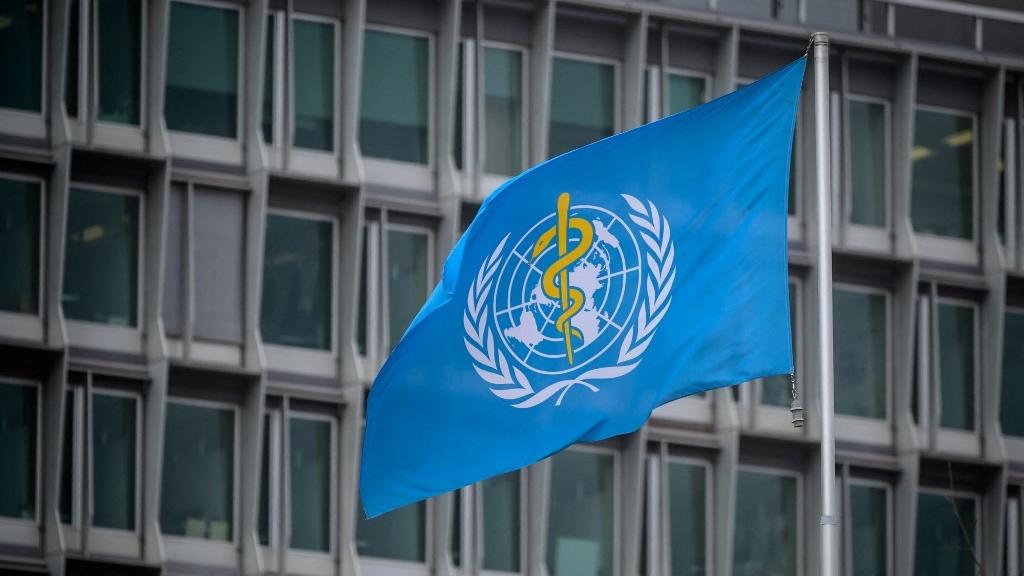 This photograph taken on March 5, 2021 shows the flag of the World Health Organization (WHO) at their headquarters in Geneva amid the COVID-19 outbreak. (FABRICE COFFRINI / AFP)
This photograph taken on March 5, 2021 shows the flag of the World Health Organization (WHO) at their headquarters in Geneva amid the COVID-19 outbreak. (FABRICE COFFRINI / AFP)
World Health Organization
The World Health Organization's vaccine advisory panel recommends that people who are immunocompromised or received an inactivated vaccine should receive a booster dose of a COVID-19 shot, the head of the panel said on Thursday.
The recommendation comes after the Strategic Advisory Group of Experts (SAGE) on immunization held a meeting on Tuesday to evaluate the need for COVID-19 boosters.
Speaking in a briefing, SAGE chair Alejandro Cravioto said emerging data shows that vaccines' efficacy against COVID-19 wanes, with a significant decline seen in older people in particular.
Meanwhile, the Omicron variant has been reported in 57 nations and the number of patients needing hospitalization is likely to rise as it spreads, the WHO in its weekly epidemiological report.
The WHO noted that more data was needed to assess the severity of disease caused by the Omicron variant and whether its mutations might reduce protection from vaccine-derived immunity.
"Even if the severity is equal or potentially even lower than for Delta variant, it is expected that hospitalizations will increase if more people become infected and that there will be a time lag between an increase in the incidence of cases and an increase in the incidence of deaths," it said.
Referring to the risk of reinfection, the WHO said: "Preliminary analysis suggests that the mutations present in the Omicron variant may reduce neutralizing activity of antibodies resulting in reduced protection from natural immunity."
"There is a need for more data to assess whether the mutations present on the Omicron variant may result in reduced protection from vaccine-derived immunity and data on vaccine effectiveness, including the use of additional vaccination doses," it said.


